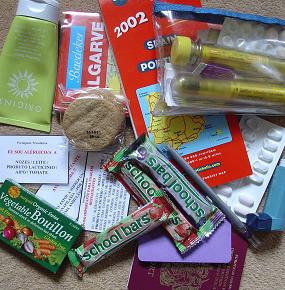The holiday season is fast approaching, so if you’re researching countries, cities and places to go and what types of food they eat you’ll know how difficult it is to find out what you want to know. Often the safest option is to book a self catering apartment so you should be able to prepare some simple meals yourself. After many experiences where I’ve been unprepared, made mistakes, and not been able to eat anything, I thought I’d share with you my check-list for going away; if you feel brave there is no reason why you can’t have a fantastic, safe holiday abroad.
1. Check your medication
Make sure your EpiPen is within date, you should always carry two EpiPens with you. Make sure you carry these in your hand luggage along with a supply of antihistamines and any other drugs you need. Pack some anti-histamines, asthma medication, steroids and skin emollients etc. in your wash bag too so you have enough to last the whole trip. You don’t want to run out and not be able to get hold of your favourites, especially if they are prescription drugs.
2. Your Doctor and Your Action Plan
I also carry a letter written by my doctor explaining (in English) why I carry an EpiPen with me and what my allergies are. This can be useful checking onto aeroplanes and if customs get suspicious of the huge needle etc. Always make sure you have your Action Plan with you too explaining what needs to happen if you do have an allergic reaction, and more importantly the names of who should be called in an emergency.
3. Sun tan lotion
Sun tan lotion is also important! If you have sensitive skin you need to be careful which brand you buy. I find Origins and Nivea are both OK for my very sensitive skin but most will give me such itchy skin I have to wash it off. P20 works very well for me. You apply it first thing in the morning, after showering and before getting dressed. It protects your skin by creating a layer that prevents the sun from damaging the skin. I have never burnt when I’ve used it but you do need to get an even covering everywhere and let it dry properly.
4. Wash bag essentials
My other must-have travel wash bag items include a small tub of vaseline, some zovirax (in case a cold sore strikes) 99% Aloe Vera gel for sunburn, witch hazel for insect bites, epaderm and diprobase (decanted into smaller tubs) for dry skin, headache pills, my pill case with all the supplements and vitamins I usually take, natural prune and senna in case of bloating and constipation, natural sleeping remedies, ear plugs, insect repellent, allergy friendly first aid kit, non latex gloves and latex free condoms – if you have a latex allergy.
5. Order allergy cards
There are lots of companies who provide translation allergy cards for different languages. You can order on-line and they should arrive fairly quickly. I’ve used Dietary Cards before. They do cards either for one allergen, and one language, a Europe package where you get five countries and you can also get up to four food types for £30. Allergy UK also do laminated language cards available in 27 languages and can be produced to cover most foods, latex, wasp and bee stings. Visit their website or call the helpline on 01322 619898.
6. Camera, paper and pen
I always have a camera with me to photograph the holiday, but also to capture any new products, fantastic meals, allergic reactions etc. You never know when a camera will come in handy. Paper and pen to take notes will help you to remember anything useful you learn for next time. It could be worth keeping a simple food and symptoms diary too in case you do have a reaction and aren’t sure what caused it.
7. Tell the airline about your allergies
Always try to let your airline know when you book your tickets that you have a life threatening allergy. In my experience airline food struggles to cater for those with allergies so it’s probably wise to take your own snacks and food. The serving of peanuts on aeroplanes has made me ill on a number of occasions. Once, despite asking them to not serve peanuts on the flight, the did anyway and when I awoke from sleeping I couldn’t understand why I was wheezing and my skin was itching until I saw all the bags of peanuts being collected up. I complained but they claimed they just didn’t serve me them but why should everyone else miss out? Hmmmm. What do you say to that? I find that you sometimes have to make a real scene when you check in and when you board the plane; tell them you have allergies, what you are allergic to and that you could die if you come into contact with even a small trace of the allergen. Ask them to take your EpiPen and show them how to use it should they inadvertently make you ill by serving peanuts. It wont make you popular but it might save your life or an uncomfortable flight anyway. Be tough. It is worth it. Flights are becoming far more understanding and often serve savoury biscuits instead now. Also, take an antihistamine before you get on the flight. It might help to reduce the chances of symptoms occurring. If you do discover people around you are eating peanuts try to remain calm and be positive, no one is believed to have died from inhaling peanut dust on a plane, most reactions have been mild to moderate.
8. Take wet wipes
These will come in handy to just quickly wipe down arm rests, tables etc. if you are worried about them containing traces of allergens, especially in coffee shops.
9. Tell your hotel or book self catering
Make sure you are very clear when booking that you stress the seriousness of your allergies. Many hotels will make every effort to cater for you, but make sure you choose somewhere that can, or go self catering. Always my preferred option. Then you can try eating out, but have the option to eat-in if you need to. If you react to dust mites and or biological washing powder the bedding in hotels could be a problem. I take a sleeping bag liner. They are really cheap, and if you find the bed or sheets are irritating you just sleep inside this. They’re cheap to buy and fold up really small as they are quite thin cotton.
10. Take the essential food items with you
I always take small cartons of rice milk, bread, cereals (stored in easy to use one-portion-at-a-time bags – a great idea I picked up from a friend recently), oat cakes, Mrs Crimble’s cake, safe snack bars like Fruit Bowl School Bars. Also pack some stock cubes, salt, pepper, spices etc. so you can make your own meals safely if you can’t find the right foods in the shops. Herbal tea bags such as peppermint, redbush etc. come in handy too.
11. Be vigilant
Be careful. Keep all your senses working and don’t let your guard down just because you’re on holiday. It’s very easy to become careless when we have had a few too many to drink, are in different surroundings, the sun is shining, everything is good; don’t ruin that by being careless and eating anything if you don’t know exactly what it is and how it was prepared.
12. What is the emergency phone number in the country you are visiting?
If you had an anaphylactic attack in the UK you would dial 999, so what would you do abroad? Make sure you note down this important number and keep it in your purse, or write it onto your action plan with a post-it note.
13. Research before travelling
Find out what kind of food is popular in the country you are visiting. There might be some naturally gluten free dishes, breads or desserts. As well as your translation cards, make sure you have a vocabulary or glossary of words for all the allergens, derivatives and foods that you need to avoid so you can use these when out shopping as well as when ordering foods from menus. Visit the website of Gluten Free Mrs D who is an intrepid gluten free traveller. Here blog has loads of reports, reviews and tips about where to go and how to travel safely with coeliac disease of gluten intolerance.
14. Do you have adequate travel insurance?
When you arrange your insurance you should notify them that you have a life threatening food allergy and that you carry an EpiPen with you. In the past I’ve found that often the company is not remotely interested when I try to tell them this but it’s always worth asking them to write this information in the notes area. Always take your E111 card in Europe as it can just make things much easier to get help without having to pay.
15. Get a local doctor’s name
If you are really sensitive and worried that you might have an anaphylactic attack you could get the name, address and number of a local doctor in the town or city you are visiting. Hopefully you wont need it but it will give you peace of mind, could could come in very handy and help speed up any treatment.
16. Find out where the nearest hospital is
This sounds a bit drastic but if you know where the nearest hospital is, the town, address etc. at least you know where you need to get to if there is an emergency.
16. Check Facebook!
There is a ‘Gluten Free London’ and a ‘Coeliacs Portugal’ group on Facebook. If you are travelling to a city or country it could be really helpful to check out groups and pages on social media portals. You might find a gluten free cafe, restaurants that cater for allergies and tips of what to avoid. Worth a look anyway.
17. Clean the kitchen
If you book a self catering apartment wash the work tops and utensils thoroughly when you arrive to make sure they are not dirty and contain no traces of allergens.
18. Go shopping!
Buy fresh local seasonal fruit and vegetables and perhaps you could try to cook some local dishes yourself at your apartment. Always take your own food on days out. Make sure you take a flask, handy plastic containers and bags so you can make a safe packed lunch for yourself each day. If you are eating in a lot, make extra each evening so you can have the left overs for your lunch in a salad or sandwich.
19. Careful what you drink!
Buy lots of bottled water when you arrive and make sure you drink plenty and always have a bottle when you go out. More importantly check what the local drinks are and what’s in them. I’ve nearly been scuppered with a hazelnut schnapps type drink in the past. For instance, in Portugal a distilled spirit called ‘medronho’ made from the fruit of the Strawberry Tree is made – if you are allergic to strawberries you’d need to watch out for this.
20. Take your own utensils
I have a friend who takes her own mini wok and utensils when she travels. If you are really worried this would really give you peace of mind even if it does add to the weight of you bag!
21. Stay safe please!
Finally have fun. You are going away to explore, learn about a new culture, recharge your batteries and most importantly enjoy yourself and don’t forget your sunglasses and sun hat.
If you do have to use your EpiPen whilst on holiday you should immediately try to obtain a replacement. If you need to go to hospital ask them if they can prescribe you one. If not, visit the nearest chemists as soon as you can and ask them if they can help. I have no idea if you can obtain prescription medicine whilst abroad but I wouldn’t feel safe without my EpiPen so this is something I need to find out about.
If you’re really worried about travelling abroad, not being understood and not knowing what to eat, you can have fantastic holidays in English speaking countries. If you are too worried you won’t enjoy your holiday so just be realistic.
Anyway I’m excited about my holiday later this year. A little apprehensive but if we have to eat in every night it wont be the end of the world. The sun will be shining (it will!), the weather will be warm, the iPhone will be hidden away at home and the laptop will most definitely be banned. No Facebook, Twitter or LinkedIn for a whole week – yikes! A complete break from the whirl of work, blogging and everyday chores. I can’t wait… the notebook will not be far away though so expect exciting news on our return.
Are you planning a holiday abroad and have allergies? Discovered anywhere brilliant? Please share your experiences of places you’ve been which catered well, I’d love to hear about it.
References:
Food Allergies by Tanya Wright
Allergies at your fingertips by Dr Joanne Clough
Allergy UK













Ouch. I don’t like allergy. One of my daughters has allergy to seafood. It’s a good thing she’s not allergic to fish.
I’m now 62 and all my life I have suffered from asthma, with sensitivity to chemicals such as aftershave, deodorants, perfumes etc , the vast list of cleaning agents and air fresheners and of course smokers. Socializing and going on holidays was always a mine field. In 2005 we moved to the mountains in south Kerry in southern Ireland….clean fresh air at last, on 6 acres of mountainside in a beautiful valley. In 2012 we built a timber framed passive house, yes we, as in my wife Liz & myself. Our mission was to build a chemical free, healthy house – a PURE SPACE. No chemicals were used in the building of the house and no chemicals are used in the day to day running of the house. We have an in built HRV system, heat recovery ventilation system which also filtrates the incoming air. We have succeeded in creating that PURE SPACE and living here has had a very positive impact on my health.We also had a vision of sharing this space with people who have a similar experience to mine & we are now launching our PURE SPACE accommodation. All information can be had on our website inwoodanything.com and you can contact us at info@inwoodanything.com We are so looking forward to sharing this space with like minded people.